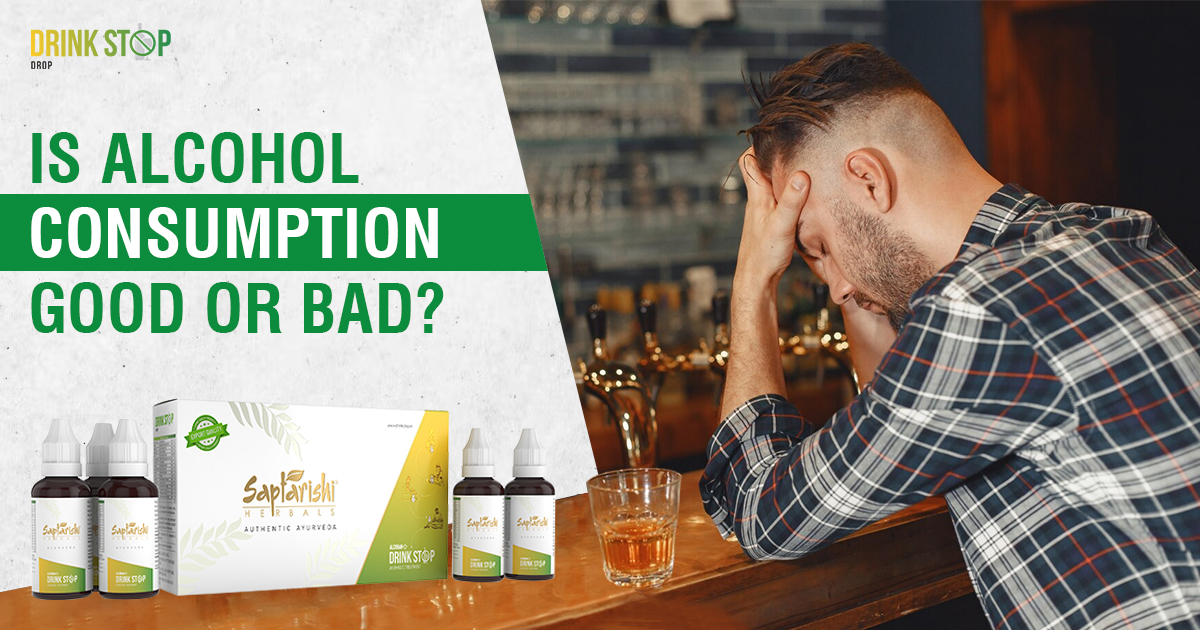
The debate on alcohol consumption has been going on for ages. Some believe enjoying a little alcohol doesn't make a big impact on health but others are opposed to that belief. With the increasing trend of alcohol consumption in social gatherings, let's find out the pros and cons of drinking alcohol and also for those who wish to stop drinking, we would find strategic ways out of alcoholism.
To start with the discussion, “Is alcohol consumption good or bad,” we have to understand the upsides and downsides of drinking alcohol. So, let's start counting the advantages first.
Social Benefits: Alcohol becomes a medium tomingle, unwind, and connect to people in gatherings.
Health Benefits: Studies show moderate drinking protects against heart disease, gallstones, and type 2 diabetes. These studies emphasize moderate drinking only.
Below are a few risks associated with drinking alcohol.
Health Risks: If moderate drinking is said to be beneficial, excess alcohol intake increases the risk of heart and liver diseases. Heavy drinking of alcohol also adds to the risk of various types of cancers including cancers of the mouth, lungs, larynx, breast, colon, and rectum. Weight gain is also linked to alcoholism.
Addiction: Alcohol tends to make people addicted to it. It needs one to have the self-control to stop at one drink and everyone doesn't have that restraint. Alcohol addiction and dependence result in various psychological and physiological problems.
Personal, family, and Social Issues: Alcohol abuse can strain social and family relationships. It can lead to financial problems. Personal well-being gets compromised causing illness, anxiety, stress, and a sense of aversion toward life.
For those who want to stop drinking alcohol,the strategic steps to quit alcohol are:
Understand the problem: To bring significant changes it is essential to understand your relationship with alcohol, how deeply it has affected you, and how dependent are you on alcohol. Based on these understandings and once you are ready to quit,alcohol addiction treatments are planned.
Helping Hands: Nasha Mukti Kendras provide professional help taking into account every aspect of your problems including the extent of physical and mental effects of alcoholism on the individual.
Nasha Mukti Medicine: Nasha mukti dava or de-addiction medicines help to combat withdrawal symptoms and cravings. There are natural and ayurvedic de-addiction medicines available that are safe and have almost noside effects. With these nasha mukti medicines, you can reduce the ill effects of alcohol and gradually reduce alcohol dependence.
Care Groups: Groups such as Alcoholics Anonymous (AA) introduce you to people who have a similar story of alcoholism, dependence, and addiction to share with you. They motivate an alcoholic to stop drinking by sharing their battles and victories.
Devise a Plan: Devising a plan makes the process of quitting more achievable. Decide what are you expecting, whether to reduce alcohol consumption or to stop it completely. What triggers you to drink alcohol? What are the measures that can help to stick to the plan without giving in to the cravings? These are some of the questions that are required to be answered while devising the plan.
Lifestyle Changes: Taking up a lifestyle that's good for your overall health assist in quitting drinking. Join activities that help you enjoy and to be at peace with you.
Don't succumb to temptations: Avoid keeping liquor, wine, or any of your favorite alcohol at home. Stay away from the places where alcohol is served commonly.
Stay active: Re-live your good old days by engaging in hobbies that you loved. Go for those activities that you enjoy as they will divert you from the impulse to drink.
Remind yourself: Educate yourself about the ill effects of alcohol on your physical and mental health. This will strengthen your decision and help you stay motivated to quit alcohol
Practice saying no to alcohol: Teach yourself how to respectfully refuse alcohol served in social gatherings.
By going through the upsides and downsides of alcohol consumption, we can weigh that the risks associated with alcoholism are greater than the benefits. Quitting alcohol asks for a lasting commitment. Patience is the key as delays are quite normal. Once you understand that drinking alcohol can't be an answer to your life's problems and alcohol-free life will help you to lead a healthy and happy life, your determination to quit alcohol becomes stronger.
Anything is fine until it doesn't upset your physical, emotional, or mental balance. And this “anything” includes alcohol consumption, so say no to alcohol and be a happier and healthier version of yourself.